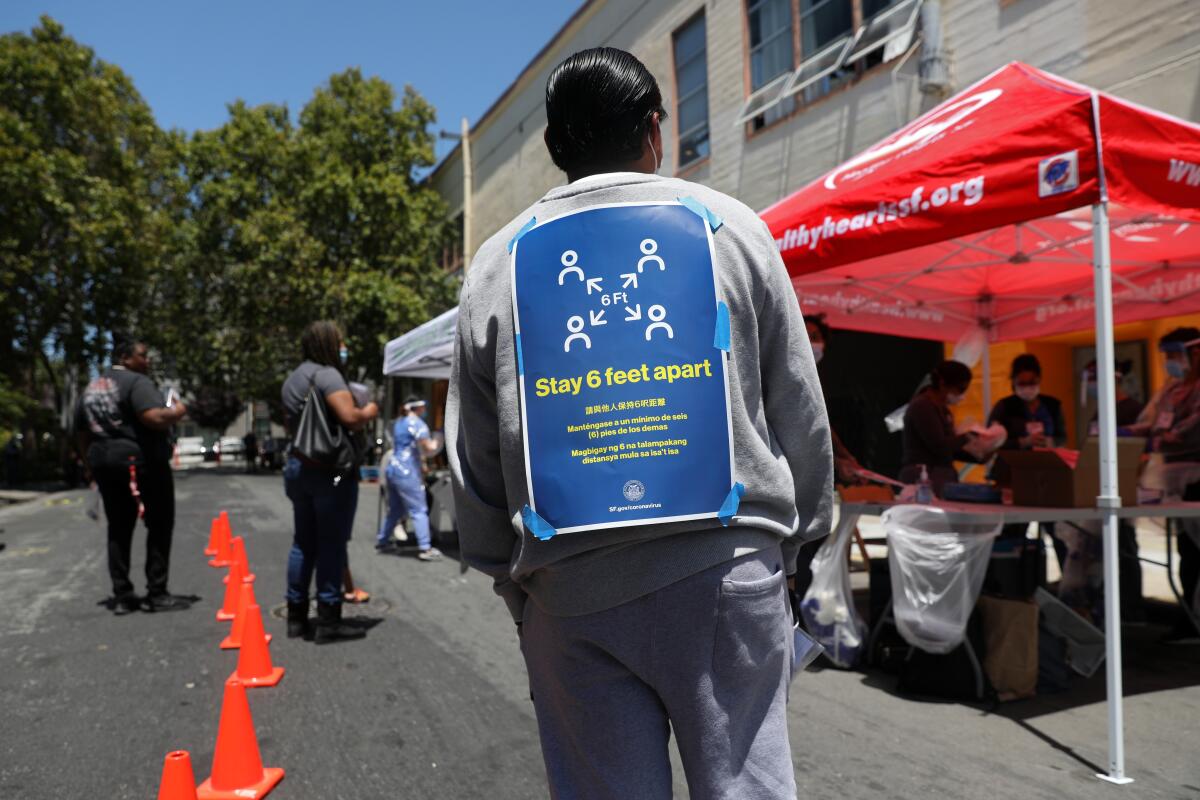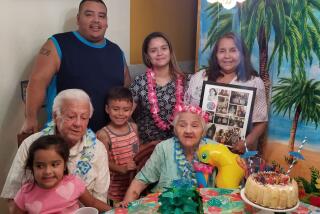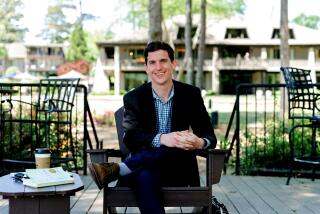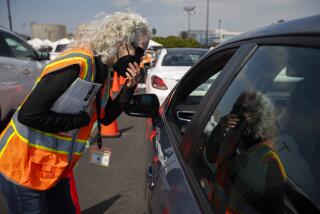Don’t be a ‘pandejo.’ Take the pandemic seriously

- Share via
It’s a morality tale out of Edgar Allan Poe or “The Twilight Zone.”
As the coronavirus raged on, a Latino scoffed at the pandemic. This person didn’t think it was real, or thought it a trifle barely worse than a cold. It didn’t matter that COVID-19 has wrecked Latinos in a way like few other ethnic groups:
The disease didn’t affect the skeptic, so they lived life with no care in the world. With defiance. Even pride.
And then they got it.
To atone for their sins, the now-sick Latino put out a testimonial to anyone who might listen to not make the same mistakes they once did. Wear a mask, please. Social distance. Shelter in place. Take la corona seriously.
Because for the protagonist of this sad story, it was too late.
It happened in June, when Tommy Macias of Lake Elsinore posted on Facebook a day before he died of COVID-19 that he contracted it at a barbecue he shouldn’t have attended. It happened in early November, when Alexa Aragonez and 14 relatives in Texas contracted the virus after a fiesta, then issued her missive while intubated in the ICU.
It happened in late November, when comedian Joe Luna — who grew up in East L.A. and Fontana and went by the stage name Joe El Cholo — said “this COVID [thing] is no joke” on Instagram a week before he succumbed to it in Palmdale.
It’ll happen again.
It’ll happen until we, like these three people bravely did during their reckonings with the dreaded disease, begin to truly call out pandejo behavior.
Never heard of the term? It’s of recent coinage, a portmanteau of “pandemic” and “pendejo,” the Mexican Spanish term for a blockhead. Pandejo is an uncharitable — but sadly accurate — word to describe Latino covidiots who proudly flout coronavirus protocols.
There are coronavirus truthers of all ethnicities, of course. But I reserve special ire for Latinos. We, of all groups, should know better.
We make up about 39% of California’s population but 59% of all COVID-19 cases and 49% of all related deaths.
The nonprofit California Health Care Foundation reported in September that 29% of Latinos in the state know someone who died of COVID-19, compared with 19% of the total population.
We know the reasons: An overrepresentation in working-class jobs that expose us daily. Preexisting health disparities. Crowded living conditions. Our love of family. Public health officials and the media have broadcast this again and again.
The coronavirus toll on Latinos has not only not changed; it’s worse.
Yet raza in my neighborhood have never stopped setting up bounce houses in their front yards during the days and party tents at night. My cousins still caravanned from Anaheim to Los Angeles to celebrate the championships of both the Dodgers and Lakers. Someone I know, who likes to pose oh-so-glamorously on Instagram with her mask on, nevertheless appeared in a wedding this summer as part of a group of maskless bridesmaids and best men as large as a royal procession.
A pox on acting like a pandejo!
Nothing will improve until we handle them. But what’s the best way to do it?
I favor the approach of Azucena Rasilla, an Oakland-based journalist. By day, she puts out thoughtful stories about coronavirus inequities in the East Bay. At night, she blasts friends on Instagram stories for partying and dining to the point of calling them selfish.
The crusade is personal for her. Her brother contracted COVID-19, and an uncle in Mexico died of the disease.
“You’re supposed to be my friend. You know what I’ve reported, and what has happened to my family,” Rasilla said. “And you’re just like, ‘Eh’!? It’s so baffling. But really, it’s disgusting. It takes people getting sick for folks to get how serious this is. But do you want to get to that point?”
More judicious is Alexandro Jose Gradilla. The Cal State Fullerton Chicano studies professor has engaged in Facebook and email debates with students — overwhelmingly Latino and working class — who insist coronavirus isn’t a thing.
Rather than rain down insults like Rasilla or myself, he urges empathy.
“Nothing has really changed for them,” Gradilla said. “They have not stopped working, so they still have the weekend. And they think, ‘I worked myself to the bone. I want to do my kickback on Sunday with friends. Who’s going to tell me otherwise?’ This isn’t a romantic, Morrissey or James Dean middle finger to the world. It’s trying to survive.”
He compares the coronavirus to the early years of the AIDS crisis, the result of another virus that disproportionately affected minorities.
“Public health workers eventually figured out that to tell people not to have any sex is unrealistic,” he said. “So they began to go to clubs, bathhouses, with condoms in one hand and literature in another. So today, we should meet Latinos where they go — embrace the fact that especially young folks are going to gather socially.
“It would take out the steam from the Trump-QAnon camp,” Gradilla said, “because their whole thing is that the cops and [Gov. Gavin] Newsom are going to come get us. But imagine the message of ‘Go ahead and have a drink, there’s public health workers here.’ It would be radical.”
Somewhere between Rasilla and Gradilla is Alexis Perez Nava, a senior organizer for the Koreatown Immigrant Workers Alliance.
He moved back to Santa Ana this fall after a couple of years in Los Angeles, and was surprised that people in his hometown — a city severely affected by the coronavirus — weren’t taking the pandemic seriously.
Including his own family.
“Some people might be, ‘Lo que Dios quiera’ [‘If God wants it’], or ‘It’s not going to happen,’” the 32-year-old said. “Or, ‘It’s not a big deal. I survived many things in life, and COVID isn’t going to take me down.’”
A couple of weeks ago, his family held a party where he admits relatives “really didn’t follow [coronavirus] guidelines.” Ten people attended. Nava and two others contracted COVID-19 and are now recovering.
He does think we need to call out pandejos, but in a way that makes them “realize that we [Latinos] can take care of each other and pull through together anything, because we’ve done it before.” He’s already noticing more people around Santa Ana masking up as the virus worsens, “including the señor who just kicks it on the front yard, just chilling by himself.”
That’s a start. Shame isn’t the most effective tool to make someone stop a bad habit. But then again, I heard three separate parties this past weekend near my house scored by banda, mariachi and conjunto norteño.
I wasn’t going to call the cops on them. But maybe I should’ve gotten into my Yukon, bullhorn in hand, and shouted, “¡Pandejos!”
More to Read
Sign up for Essential California
The most important California stories and recommendations in your inbox every morning.
You may occasionally receive promotional content from the Los Angeles Times.














